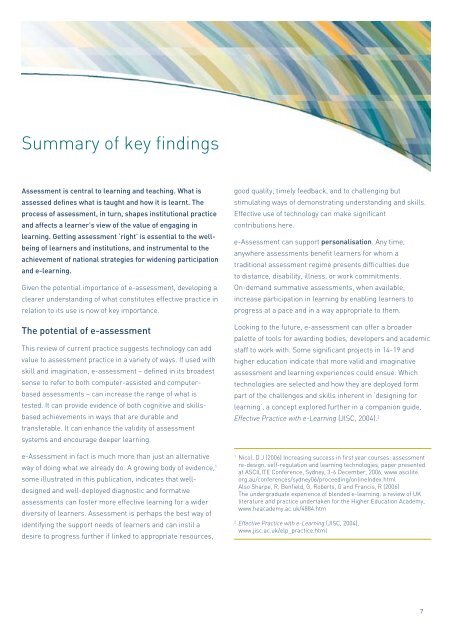Effective Practice with e-Assessment: An overview of ... - Jisc
Effective Practice with e-Assessment: An overview of ... - Jisc
Effective Practice with e-Assessment: An overview of ... - Jisc
Create successful ePaper yourself
Turn your PDF publications into a flip-book with our unique Google optimized e-Paper software.
Summary <strong>of</strong> key findings<br />
<strong>Assessment</strong> is central to learning and teaching. What is<br />
assessed defines what is taught and how it is learnt. The<br />
process <strong>of</strong> assessment, in turn, shapes institutional practice<br />
and affects a learner’s view <strong>of</strong> the value <strong>of</strong> engaging in<br />
learning. Getting assessment ‘right’ is essential to the wellbeing<br />
<strong>of</strong> learners and institutions, and instrumental to the<br />
achievement <strong>of</strong> national strategies for widening participation<br />
and e-learning.<br />
Given the potential importance <strong>of</strong> e-assessment, developing a<br />
clearer understanding <strong>of</strong> what constitutes effective practice in<br />
relation to its use is now <strong>of</strong> key importance.<br />
The potential <strong>of</strong> e-assessment<br />
This review <strong>of</strong> current practice suggests technology can add<br />
value to assessment practice in a variety <strong>of</strong> ways. If used <strong>with</strong><br />
skill and imagination, e-assessment – defined in its broadest<br />
sense to refer to both computer-assisted and computerbased<br />
assessments – can increase the range <strong>of</strong> what is<br />
tested. It can provide evidence <strong>of</strong> both cognitive and skillsbased<br />
achievements in ways that are durable and<br />
transferable. It can enhance the validity <strong>of</strong> assessment<br />
systems and encourage deeper learning.<br />
e-<strong>Assessment</strong> in fact is much more than just an alternative<br />
way <strong>of</strong> doing what we already do. A growing body <strong>of</strong> evidence, 1<br />
some illustrated in this publication, indicates that welldesigned<br />
and well-deployed diagnostic and formative<br />
assessments can foster more effective learning for a wider<br />
diversity <strong>of</strong> learners. <strong>Assessment</strong> is perhaps the best way <strong>of</strong><br />
identifying the support needs <strong>of</strong> learners and can instil a<br />
desire to progress further if linked to appropriate resources,<br />
good quality, timely feedback, and to challenging but<br />
stimulating ways <strong>of</strong> demonstrating understanding and skills.<br />
<strong>Effective</strong> use <strong>of</strong> technology can make significant<br />
contributions here.<br />
e-<strong>Assessment</strong> can support personalisation. <strong>An</strong>y time,<br />
anywhere assessments benefit learners for whom a<br />
traditional assessment regime presents difficulties due<br />
to distance, disability, illness, or work commitments.<br />
On-demand summative assessments, when available,<br />
increase participation in learning by enabling learners to<br />
progress at a pace and in a way appropriate to them.<br />
Looking to the future, e-assessment can <strong>of</strong>fer a broader<br />
palette <strong>of</strong> tools for awarding bodies, developers and academic<br />
staff to work <strong>with</strong>. Some significant projects in 14-19 and<br />
higher education indicate that more valid and imaginative<br />
assessment and learning experiences could ensue. Which<br />
technologies are selected and how they are deployed form<br />
part <strong>of</strong> the challenges and skills inherent in ‘designing for<br />
learning’, a concept explored further in a companion guide,<br />
<strong>Effective</strong> <strong>Practice</strong> <strong>with</strong> e-Learning (JISC, 2004). 2<br />
1<br />
Nicol, D J (2006) Increasing success in first year courses: assessment<br />
re-design, self-regulation and learning technologies, paper presented<br />
at ASCILITE Conference, Sydney, 3-6 December, 2006, www.ascilite.<br />
org.au/conferences/sydney06/proceeding/onlineIndex.html<br />
Also Sharpe, R, Benfield, G, Roberts, G and Francis, R (2006)<br />
The undergraduate experience <strong>of</strong> blended e-learning: a review <strong>of</strong> UK<br />
literature and practice undertaken for the Higher Education Academy,<br />
www.heacademy.ac.uk/4884.htm<br />
2<br />
<strong>Effective</strong> <strong>Practice</strong> <strong>with</strong> e-Learning (JISC, 2004),<br />
www.jisc.ac.uk/elp_practice.html<br />
7
















